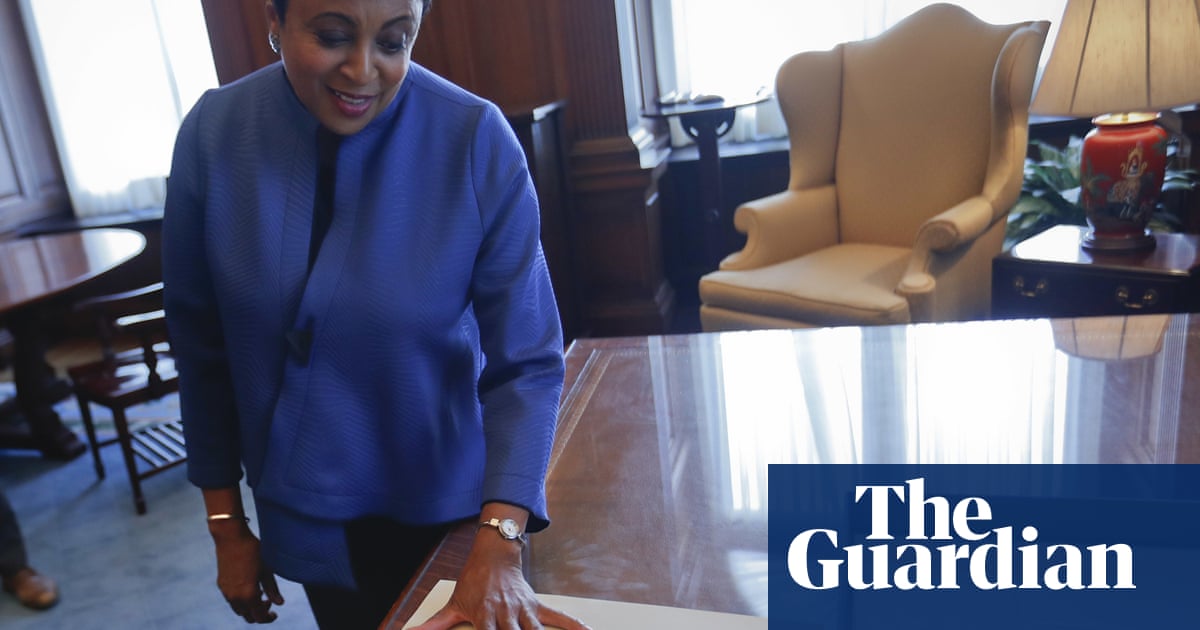The Abrupt Dismissal of Carla Hayden: A Closer Look at the Librarian of Congress
On a seemingly ordinary Thursday, the world of library science and federal stewardship was shaken when President Donald Trump made a controversial decision to fire Carla Hayden, the Librarian of Congress. This move, which has raised eyebrows across political and public sectors, marks a significant moment in the ongoing narrative of the Trump administration’s approach to governance.
Who is Carla Hayden?
Carla Hayden, appointed as the Librarian of Congress in 2016, made history not only as the first woman to hold the position but also as the first African American. Before her appointment, Hayden led the Baltimore Library system, earning accolades for her innovative programs that enhanced community access to literature and information. Under her leadership, the Library of Congress made strides in digital accessibility, modernizing its operations to serve a broader audience.
Hayden’s tenure was characterized by an outspoken commitment to the ideals of public libraries as "great equalizers," bridging gaps in education and providing open access to information for people from all walks of life. As she stated during National Library Week, libraries are "opportunity centers" that empower individuals with choices about the information that enriches their lives.
The Circumstances of the Firing
The decision to terminate Hayden was communicated via email from the White House’s personnel office, stating her position was terminated "effective immediately." The rather impersonal nature of this notification has drawn criticism, highlighting a lack of respect for her service and contributions to the nation’s cultural heritage.
Conservative advocacy groups, particularly the American Accountability Foundation, had targeted Hayden for alleged anti-Trump sentiments, accusing her administration of promoting what they deemed "radical" content in children’s literature. Their vocal opposition, especially on social media, seemed to precede her unceremonious dismissal.
Political Backlash and Reactions
The response to Hayden’s firing has been swift and fierce, particularly among Democratic leaders. Senate Majority Leader Chuck Schumer expressed his anger, describing Hayden as a "trailblazer, a scholar and a public servant of the highest order." Similarly, Congresswoman Rosa DeLauro condemningly noted that Hayden was "callously fired," demanding clarity from the administration regarding the rationale behind such a drastic action.
Congressman Joseph Morelle echoed these sentiments, celebrating Hayden as an "American hero" who dedicated her life to public service. Many argue that such dismissals reflect a broader trend of political purges orchestrated by the Trump administration, targeting officials and civil servants who diverge from a particular ideological path.
The Broader Implications
Hayden’s firing is not isolated but part of a larger pattern of the Trump administration seeking to reshape federal institutions to align more closely with conservative values. This includes not only the Library of Congress but also significant shifts within departments like the Pentagon and FEMA, where top officials have faced similar fates for diverging from the administration’s agenda.
The dismissals raise concerns about the future of institutional integrity and the independence of federal agencies. Critics argue that such actions could endanger the nonpartisan nature of institutions that are vital for American democracy. Without a commitment to uphold diverse perspectives, the risk of creating an echo chamber grows, threatening the foundational principles of public service and accountability.
The Library of Congress: A Cultural Treasure
The Library of Congress, located across from the Capitol in Washington D.C., is more than merely a repository of books; it holds vast collections that encompass the nation’s history, including the papers of numerous presidents and Supreme Court justices. Its mission extends to preserving and promoting America’s cultural heritage. The irony is palpable: in a day and age where information is more critical than ever, the library is facing leadership instability that could impact its role as a cornerstone of American knowledge and democracy.
Upcoming Leadership Changes
Following Hayden’s departure, Robert Newlen, the principal deputy librarian, has stepped in as the acting librarian, though uncertainties loom regarding the future direction of the institution. The Library of Congress’s ability to maintain its mission amidst the political turmoil remains to be seen, raising important questions about who will succeed Hayden and how that choice will reflect—or resist—the current political climate.
As the fallout continues from this surprising firing, it is clear that the decision to dismiss Carla Hayden is about more than just one person; it encapsulates ongoing struggles over culture, access to information, and the ideological battles shaping the federal landscape today.


